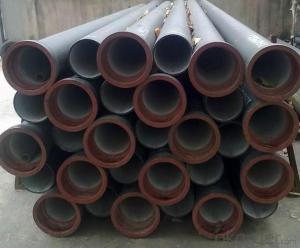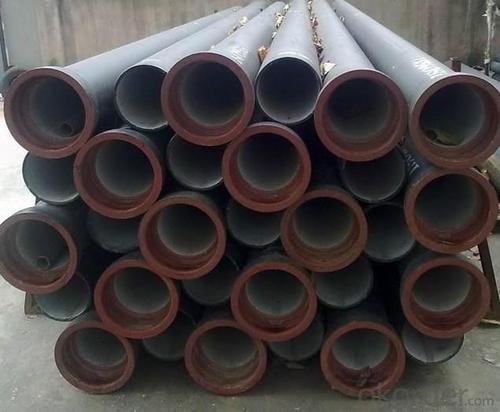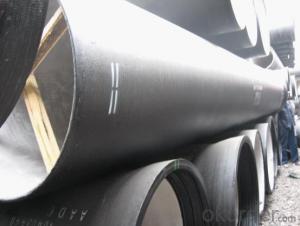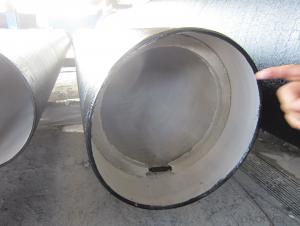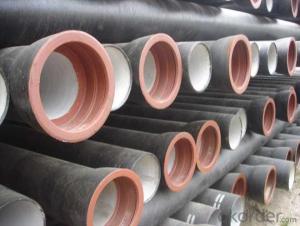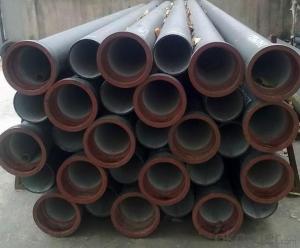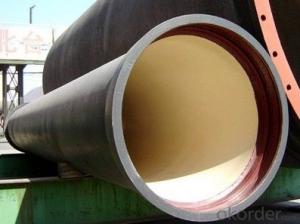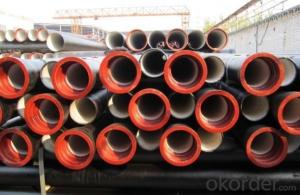Ductile Iron Pipe of China DN800 EN598 Hot Sale
- Loading Port:
- China main port
- Payment Terms:
- TT or LC
- Min Order Qty:
- 25 m.t.
- Supply Capability:
- 100000 m.t./month
OKorder Service Pledge
OKorder Financial Service
You Might Also Like
1,Ductile Iron Pipe Description :
1) Pipes confirm to ISO2531,K9 class,T type joint,6m long,with inside cements lining conform to ISO4179, outside Zinc spraying(130g/m2) and bitumen coating(70μm) conform to ISO8179.
2) Pipe ends: Spigot and socket ends, with 100% SBR rubber gaskets accoding to ISO4633
3) we can do third party inspection according to customer's request.
4) Our products have been sold to many international market, such as Middle East and South East Asia and Africa.
2,Main Features of the Ductile Iron Pipe:
•High yield strength
•High tensile Strength
•High corrosion resistance
•Pressure Resistence
•Anti-corrosion
•Installation is convenient
1).Packing and Shipping
• standard export package(carton/wooden case/pallet)
• accept FOB,FAS,CNF,CIF door to door etc or customer designated shipping agent
2).Service
• Drawing: we can translate your original drawing, offer best suggestion on design
• Quality: we have full set quality control system to guarantee the best quality.
• Inspection: inspect in house, all our products must be checked 3 times before packing
3)Inspection
• In-house Foundry
• Third party inspection available upon requirement
4) Our goal
• To be your preferred partner
3,Ductile Iron Pipe Images:
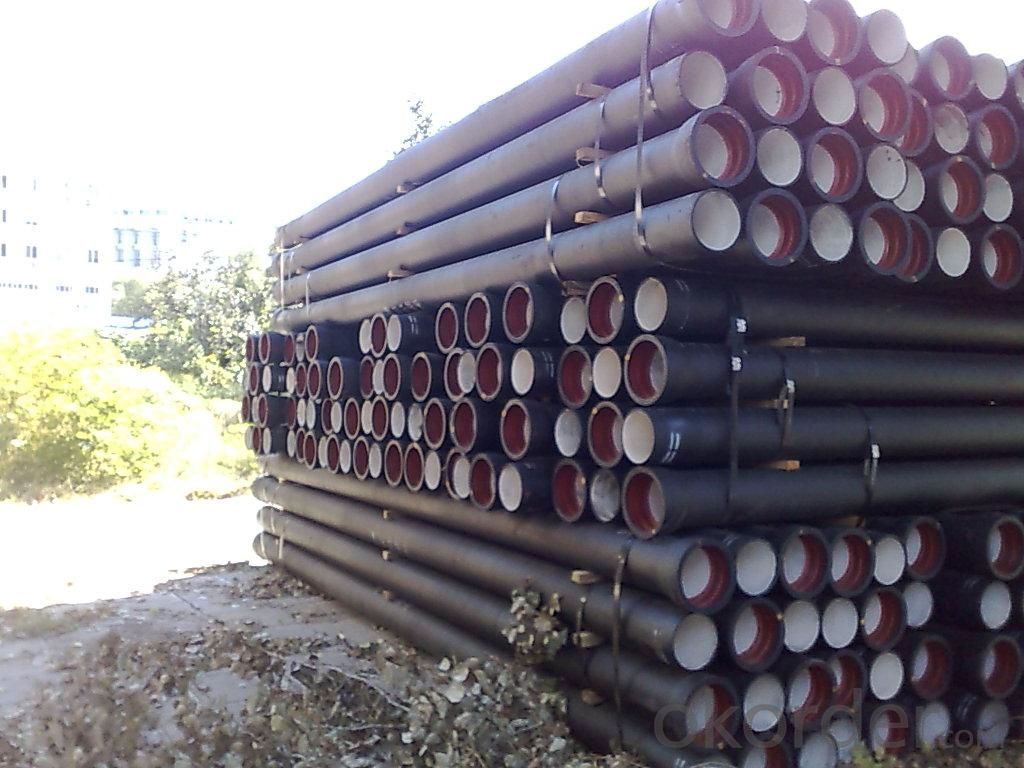
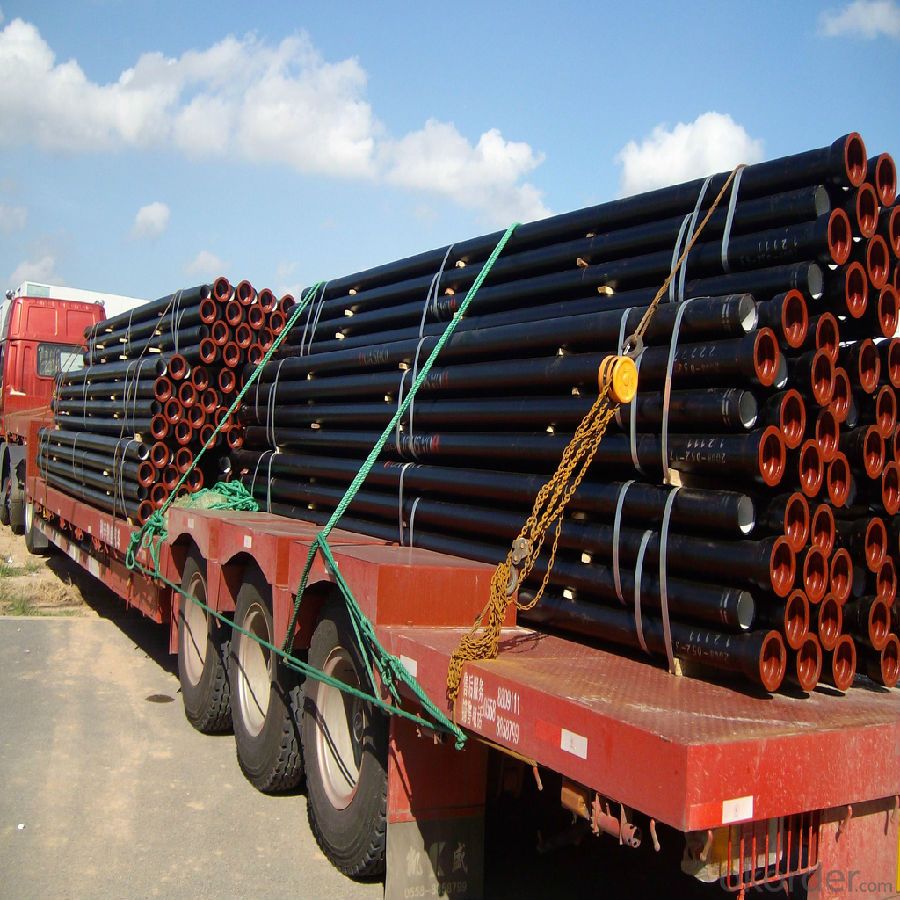
4. Ductile Iron Pipe Specification:
Standard: API SPEC 5L 44th eidtion,ASTM A252-98(2007)
Grade: A53 Grades A/B, ASTM A106 Grades B/C,ASTM A179
AWWA, C200, ASTM A139, ASTM A120, API 5L Grade B
X42, X52, X56, X60, X65, X70, X80, X100
Weld Alternatives: LSAW
OD size range: 6.4~44.5mm
Wall thickness: 406.4~1422mm
Length: 3 - 12 m according to requirment
Note: Other grade can also be provided after consulting. Special design are available
for coal slurry conveyance LSAW line tube -- Service
External coating: ductile iron pipes shall be externally coated with metallic zinc spray plus a further layer of resin painting to ISO8179.
Gasket: 100% SBR/NBR/EPDM rubber gasket in accordance with ISO4633.
Packing: ductile iron pipes from DN100 to DN300 be bundled with steel belts, others are in bulk.
Payment term: L/C, T/T.
Packing: In bulk vessel or in container
5.FAQ:
We have organized several common questions for our clients,may help you sincerely:
1.Q: Why would you choose ductile iron pipe rather than other pipe materials?
A:The reasons are obvious for that not only ductile iron pipe possesses the inherent strength and flexibility of ductile iron, combined with proven corrosion protection systems, but also the cost savings can be achieved from design to installation and commissioning.
2.Q:Why can you guarantee the inner of pipes can’t be corroded?
A: High alumina cement mortar lining and sulphate-resistant cement mortar lining. These two special linings are applicable to inner anti-corrosion for sewage pipes, improving resistance to erosion of the sewage components.
- Q: The difference between ductile iron pipe and UPVC drain pipe
- Centrifugal ductile iron pipe is ideal for urban water supply, gas pipelines, sets of high strength, good ductility and corrosion resistance advantages, performance with nature, iron and steel, is the replacement of the traditional cast iron pipe and common steel pipe renewal;
- Q: Can ductile iron pipes be used for offshore oil and gas installations?
- Offshore oil and gas installations can utilize ductile iron pipes. Ductile iron, a cast iron variant, possesses exceptional strength and durability, rendering it suitable for diverse applications, including offshore environments. These pipes exhibit high tensile strength and corrosion resistance, making them ideal for transporting oil and gas amidst harsh offshore conditions. In subsea pipelines, risers, and flowlines, ductile iron pipes are frequently employed due to their capacity to endure high pressures and withstand external forces like waves, currents, and impacts. Moreover, they can handle the elevated temperatures and pressures associated with offshore oil and gas production. Furthermore, ductile iron pipes boast a lengthy service life and require minimal maintenance, thereby reducing overall operating costs for offshore installations. They are also readily available and cost-effective when compared to alternative materials such as steel. Nevertheless, it is crucial to consider project-specific requirements, environmental conditions, and the compatibility of ductile iron with other materials utilized in the offshore installation. Proper engineering analysis and design considerations are necessary to ensure the suitability and safety of ductile iron pipes for offshore oil and gas installations.
- Q: What are the different types of fittings available for ductile iron pipe?
- Ductile iron pipe offers a variety of fittings to accommodate different plumbing or piping systems. These fittings come in various configurations to connect, redirect, or branch off the pipe. One frequently used fitting is the flanged fitting, which has a flange or lip on one end for easy bolted connection to another flanged component. Flanged fittings are ideal for applications requiring a tight seal, such as water or sewage systems. Another option is the mechanical joint fitting, which utilizes a gasket and mechanical bolts to securely connect two pipe pieces. This type of fitting is often employed in underground water or sewer systems. Push-on fittings are also popular for ductile iron pipe. These fittings have a rubber gasket that is compressed onto the pipe, ensuring a watertight seal. They are quick and easy to install, making them perfect for applications where speed and efficiency are crucial. When a change in direction is necessary, ductile iron pipe fittings like elbows or bends are utilized. These fittings smoothly alter the pipe's direction without causing significant flow restrictions. Furthermore, saddle fittings are available for ductile iron pipe. These fittings create a branch connection on an existing pipeline without the need for cutting or welding. They are commonly used in irrigation or fire protection systems. In conclusion, the range of fittings for ductile iron pipe provides options to meet the specific requirements of different plumbing or piping systems. Whether it's flanged fittings for a tight seal, mechanical joint fittings for underground applications, push-on fittings for quick installation, or specialized fittings like elbows or saddle fittings, each type serves a specific purpose within the overall plumbing or piping system.
- Q: Deep well spiral iron pipe, or ductile iron tube?
- Ductile weakness: ductile cast iron pipes connected by human factors such as the operation level of responsibility, influence, construction not convenient. The advantages of PE PE PE pipe has good corrosion resistance and its anti inorganic performance than that of the metal pipe is much stronger in the buried without corrosion, construction convenient. Small diameter PE pipe in the price performance ratio is better than that of steel and ductile iron.PE tube have disadvantages: benzene, gasoline, carbon tetrachloride and other organic solvents have certain effect on pe. If the organic solvent is infiltrated into the polyethylene, the swelling will occur, and its physical properties will be decreased. Its pressure resistance and temperature resistance are poor.
- Q: Can ductile iron pipes be used in areas with high groundwater levels?
- Yes, ductile iron pipes can be used in areas with high groundwater levels. Ductile iron pipes are known for their durability and strength, making them suitable for various underground applications, including areas with high water tables. They have a robust construction that can withstand external pressures and corrosive environments, making them an excellent choice for water and wastewater systems in such areas.
- Q: How does ductile iron pipe perform in areas with high soil consolidation?
- Ductile iron pipe performs well in areas with high soil consolidation due to its inherent strength and durability. The pipe's flexibility allows it to withstand ground movement, settlement, and consolidation without compromising its structural integrity. Additionally, ductile iron is resistant to corrosion, making it a suitable choice for areas with varying soil conditions.
- Q: Can ductile iron pipe be used for marine and offshore applications?
- Ductile iron pipe is suitable for marine and offshore applications due to its high strength and durability. It is well-known for its ability to withstand demanding environments and is particularly resistant to corrosion, including the corrosive effects of saltwater and harsh marine conditions. Moreover, its ductility allows for flexibility and resistance to cracking or fracturing under high-pressure conditions. These exceptional properties make ductile iron pipe a dependable choice for transporting fluids and gases in marine and offshore industries, such as offshore oil and gas platforms, marine structures, and underwater pipelines. To further enhance the corrosion resistance of ductile iron pipes in marine and offshore applications, it is essential to utilize proper coating and cathodic protection systems.
- Q: What is the expected sound transmission loss of ductile iron pipes?
- The sound transmission loss of ductile iron pipes can vary depending on factors like pipe thickness, diameter, and the surrounding environment. Generally, ductile iron pipes have good soundproofing properties because they are dense and heavy. They are designed to minimize noise transmission and vibration. Ductile iron pipes can significantly reduce noise transmission. The material's density and mass block sound waves and reduce their transmission. However, it is important to note that the sound transmission loss of ductile iron pipes may not be as high as other specialized soundproofing materials like acoustic insulation or double-wall piping systems. To accurately determine the expected sound transmission loss of ductile iron pipes in a specific application, it is recommended to consult the manufacturer's specifications or conduct acoustic tests following relevant standards like ASTM E90. These tests can provide precise data on the sound transmission loss values of ductile iron pipes under different conditions, ensuring proper noise control and acoustic performance in specific installations.
- Q: How much is the installation fee of the 400 largest ductile iron pipe?
- Compared with the PE pipe, from the installation time, ductile pipe PE pipe installation is simple and rapid, and after the installation of internal and external pressure bearing better tightness and corrosion resistance; from the point of view, ductile pipe sealing better after installation, but also can improve the corrosion resistance through various anti-corrosion methods;
- Q: Are ductile iron pipes suitable for use in oil refineries?
- Yes, ductile iron pipes are suitable for use in oil refineries. They have excellent corrosion resistance and high tensile strength, making them ideal for transporting various fluids and gases in harsh environments such as oil refineries. Additionally, their flexibility and durability allow for easy installation and maintenance, ensuring reliable operations in refinery facilities.
Send your message to us
Ductile Iron Pipe of China DN800 EN598 Hot Sale
- Loading Port:
- China main port
- Payment Terms:
- TT or LC
- Min Order Qty:
- 25 m.t.
- Supply Capability:
- 100000 m.t./month
OKorder Service Pledge
OKorder Financial Service
Similar products
Hot products
Hot Searches
Related keywords
